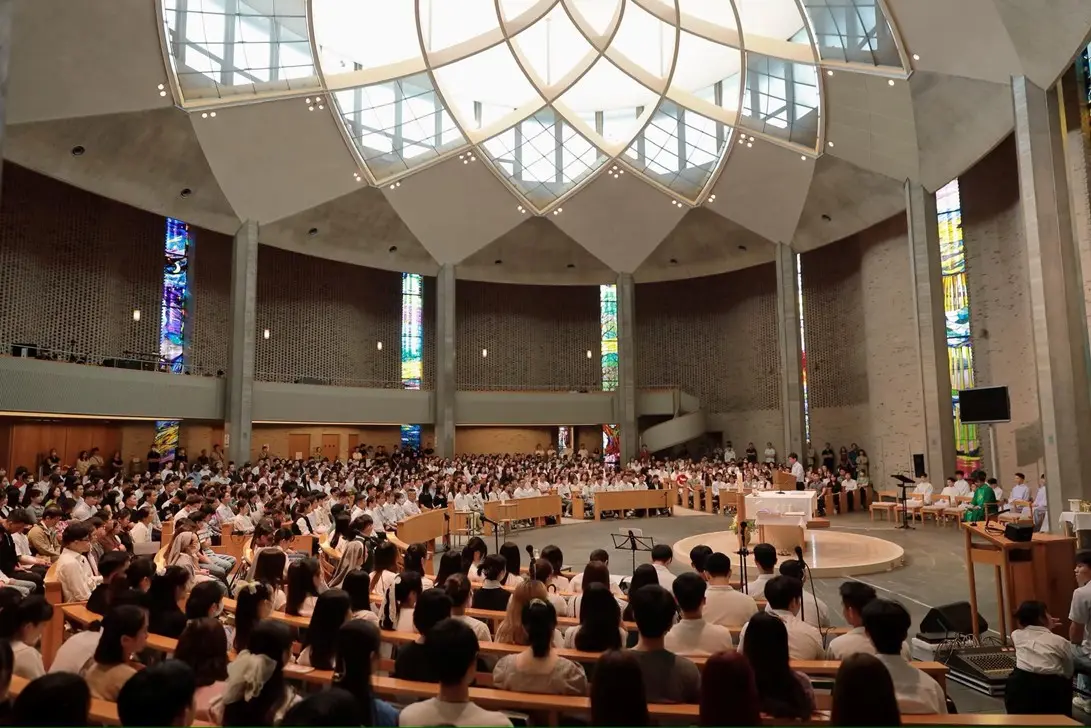A Vietnamese-language Catholic Mass held at St. Ignatius Church in Kojimachi, Tokyo, has become a central gathering point for the growing Vietnamese migrant community in Japan.
Celebrated every Sunday at 3:00 p.m., the Mass draws more than 1,000 attendees, with hymns sung in Vietnamese and children moving freely around the church.
The liturgy is led by Fr. Joseph Nguyễn Thanh Nhã, SJ, who began his ministry at the parish eight years ago, according to the Vietnamese Bishops’ Conference.
“I believe the Mass reaches deep into their hearts because it’s celebrated in Vietnamese,” said Fr. Nhã, who arrived in Japan in 2009 as a seminarian. He studied at Sophia University’s Faculty of Theology before his ordination.
St. Ignatius Parish offers Mass in six foreign languages, including English, Indonesian, and Spanish. While the congregation once consisted mostly of Catholics from the United States and Europe, the number of Southeast Asian and South American worshippers has grown significantly since the 1980s.
Vietnamese migration to Japan has sharply increased—from around 50,000 in 2012 to over 600,000 in 2024. In response, the parish expanded the Vietnamese Mass from once a month to twice a week. Some faithful travel up to two hours to attend.
A youth group of around 170 supports the liturgy, including the choir, livestream team, and those assisting community members in need.
“My job is tough, but I always look forward to coming here to sing and eat together after a long week,” said Nguyễn Phương Ngọc, 25, a choir member who works at a hotel in Tokyo’s Omotesando area.
The parish has also witnessed an increase in weddings, with about 100 couples marrying there annually. Many of them choose to wed in Japan, unable to return home, and plan to celebrate with their families later.
The church also provides assistance to migrants facing difficulties, including Nguyễn Văn Anh, 32, who arrived in Japan as a technical intern in 2022 after borrowing 1.1 million yen.
He worked at a demolition company in Shizuoka Prefecture, earning 116,000 yen a month and sending 85,000 yen to his family. Unable to repay his debt, he fled after five months.
He later worked on a farm in Ibaraki and at a recycling plant in Chiba, where he was injured in a workplace accident in April 2024.
The delay in receiving medical attention led to the loss of two fingers on his left hand and injuries to three fingers on his right hand.
Because he lacked documentation, he was detained and later transferred to immigration. Fr. Nhã and a lawyer provided assistance, and Anh returned to Vietnam in March.
The number of technical interns seeking help from the parish has continued to rise. In one case late last year, a young woman in her 20s was dismissed for dating another intern, which was prohibited by her employer. She informed her supervising organization she would consult a lawyer and consider a transfer.
Fr. Nhã also recounted a suicide case involving a 27-year-old man who had arrived in Japan in debt and without knowledge of the language. “Perhaps he endured so much without being able to confide in anyone,” he said. The man’s ashes were returned to his family six months later.
“I hope to be able to walk with young people who are being pushed to the edge,” he said. “Initially, I thought that being a priest meant being called ‘Father,’ but now I hope to truly become a father to these people.”







